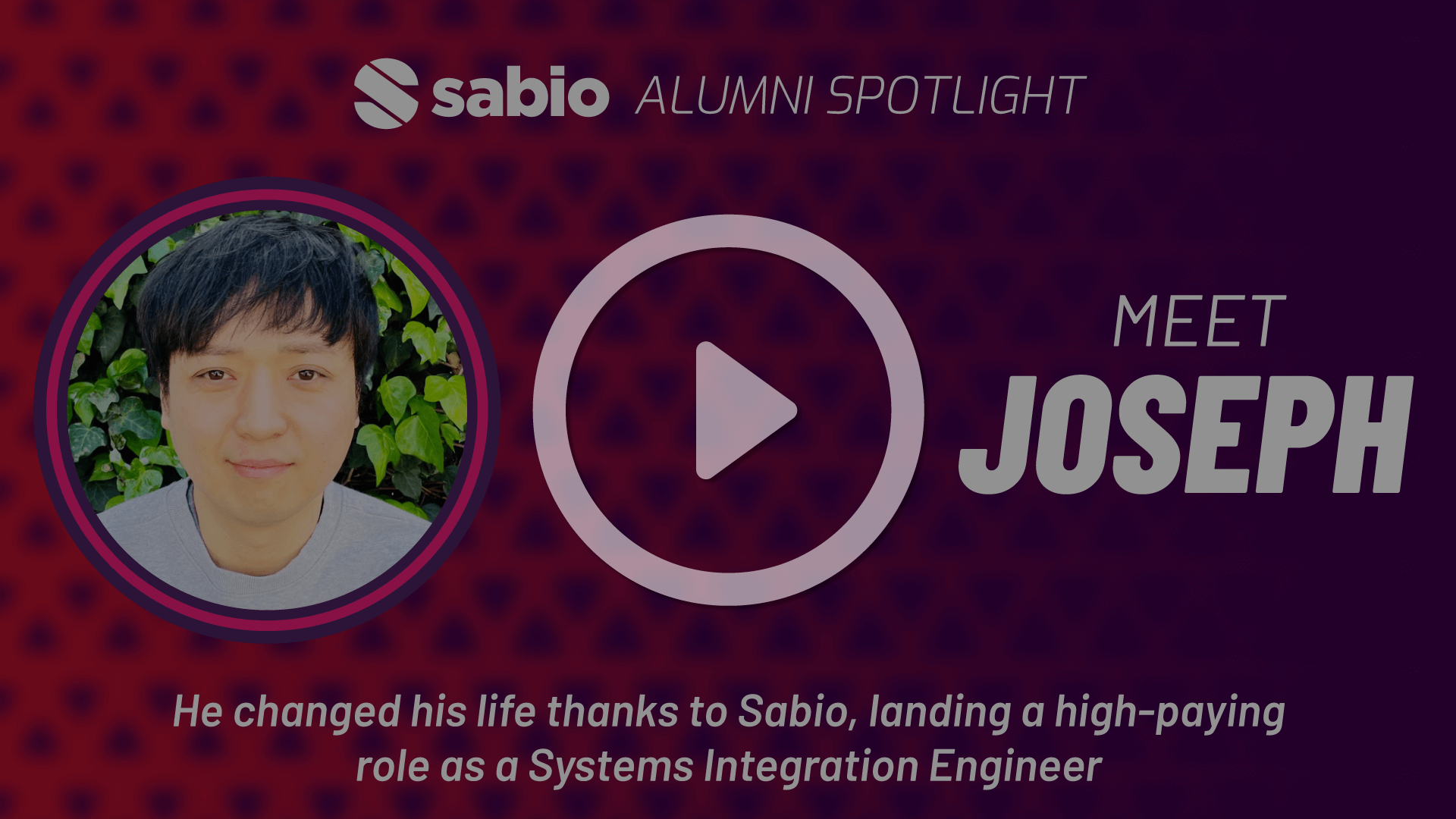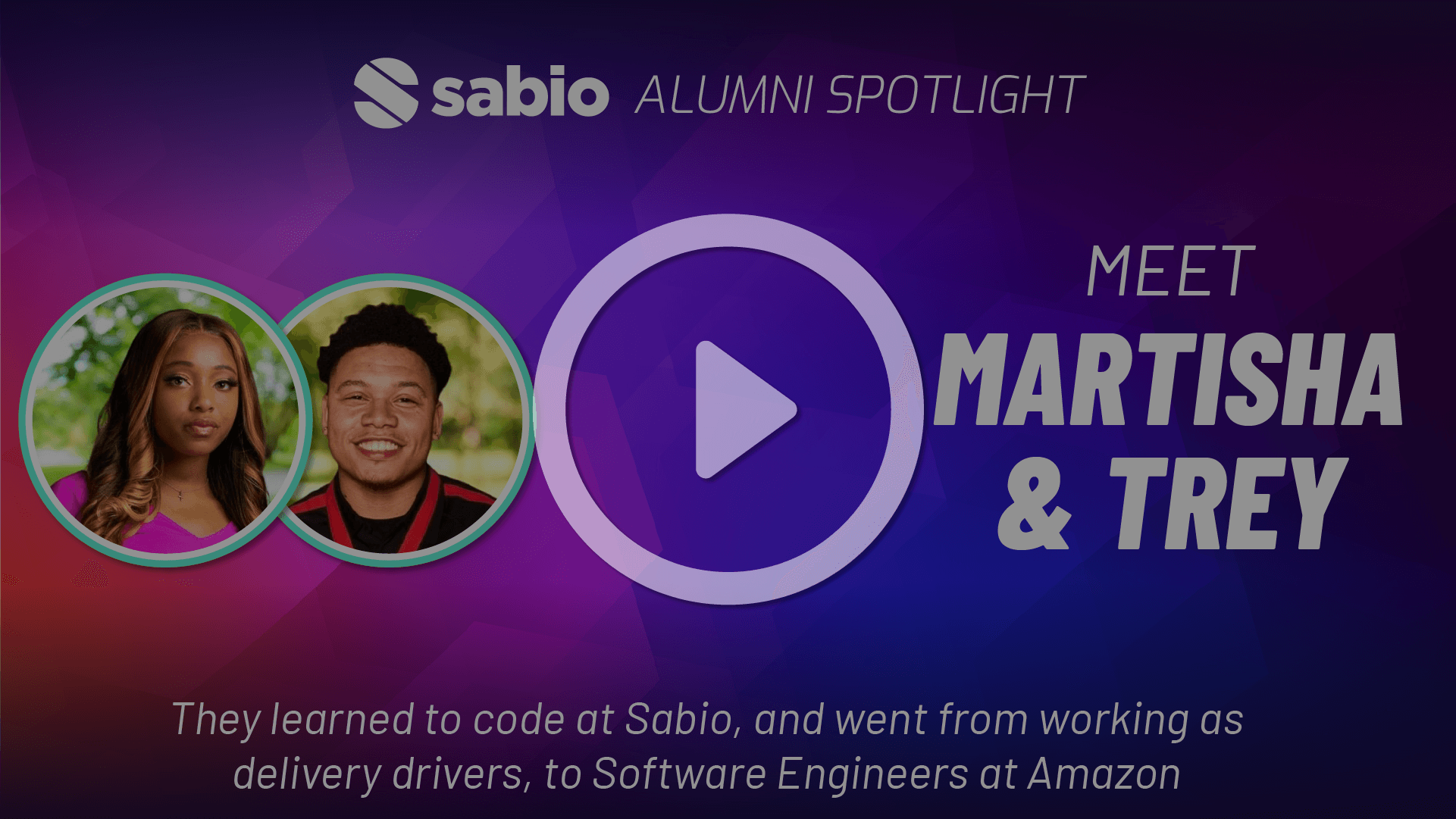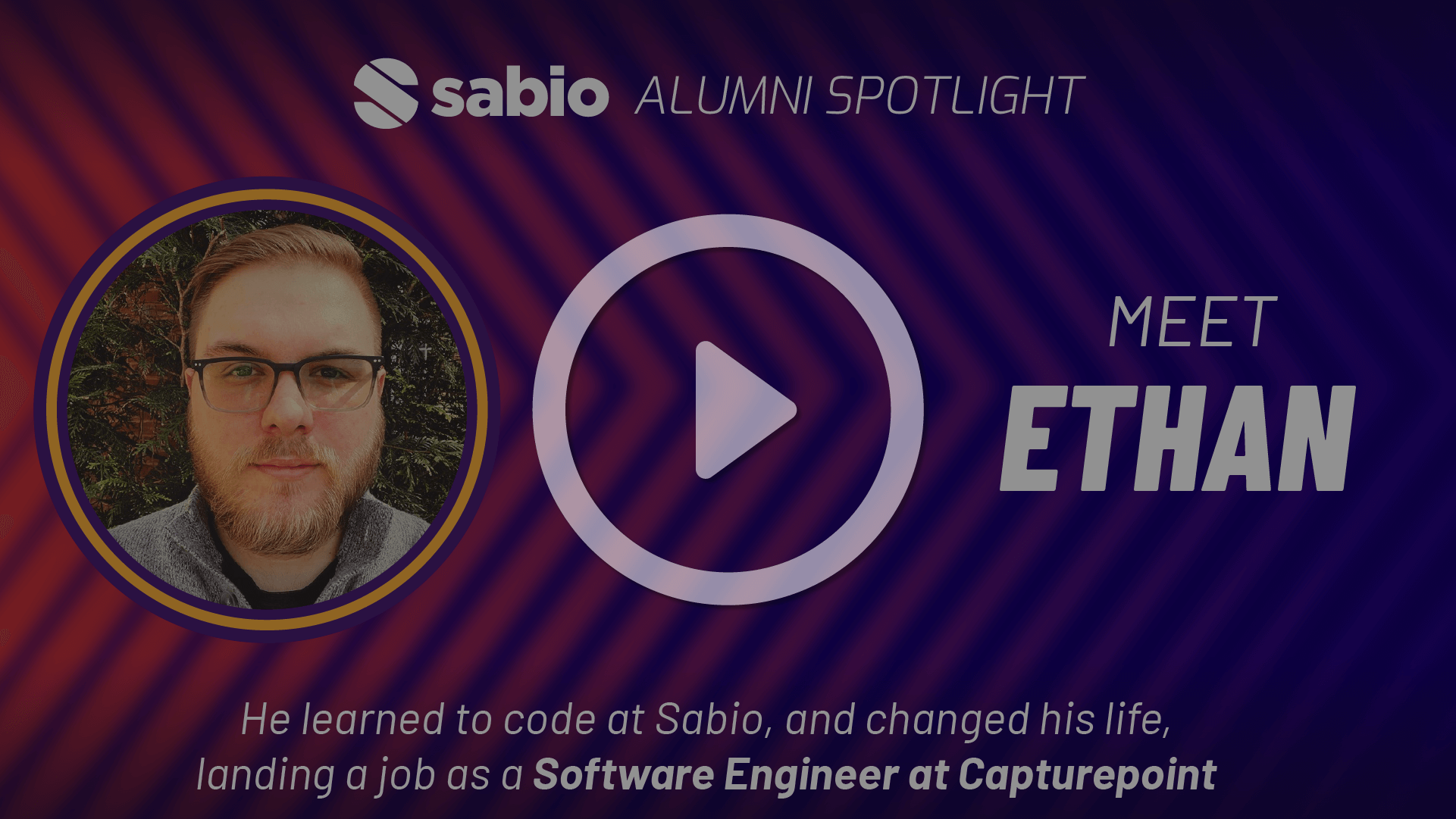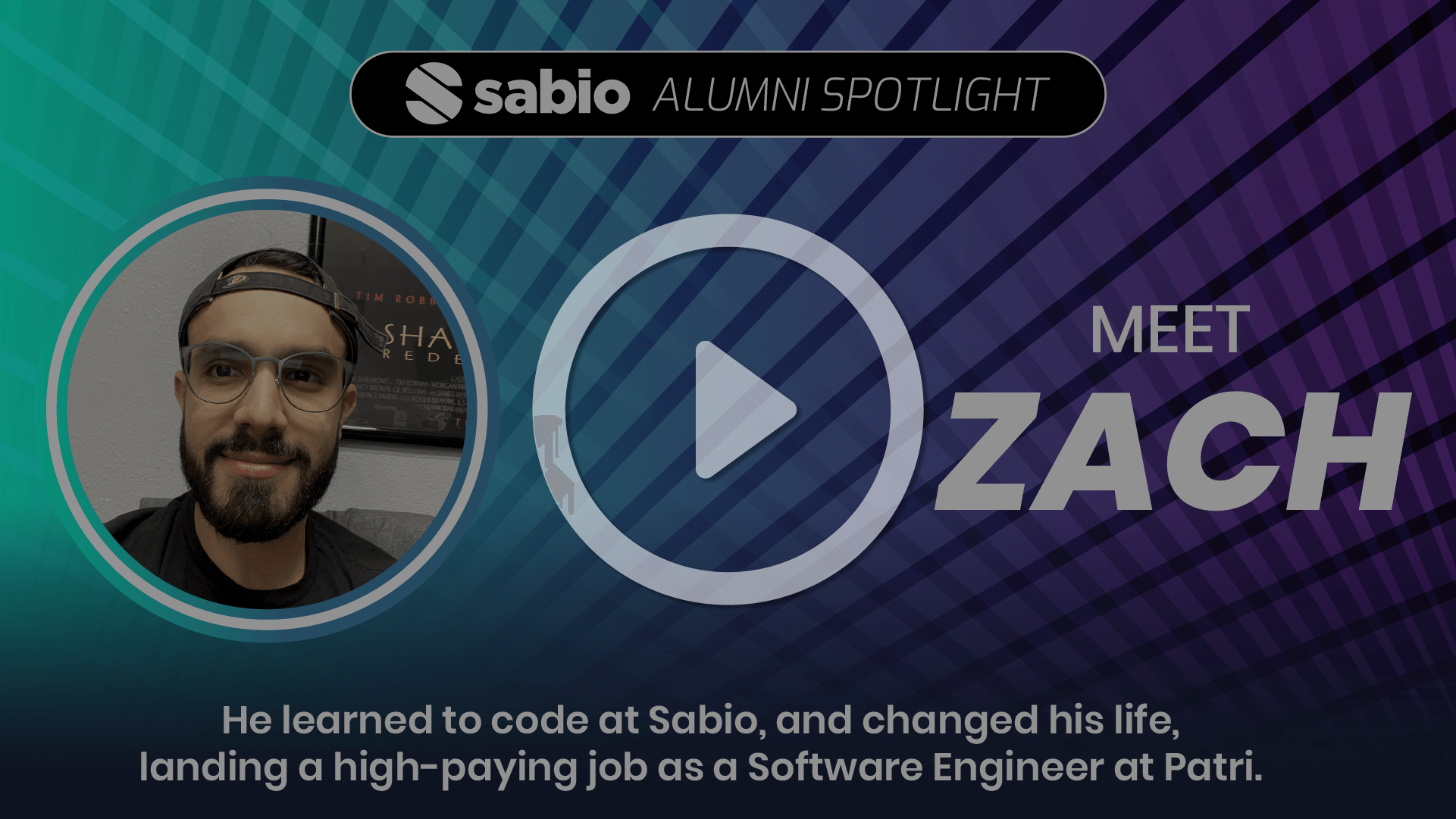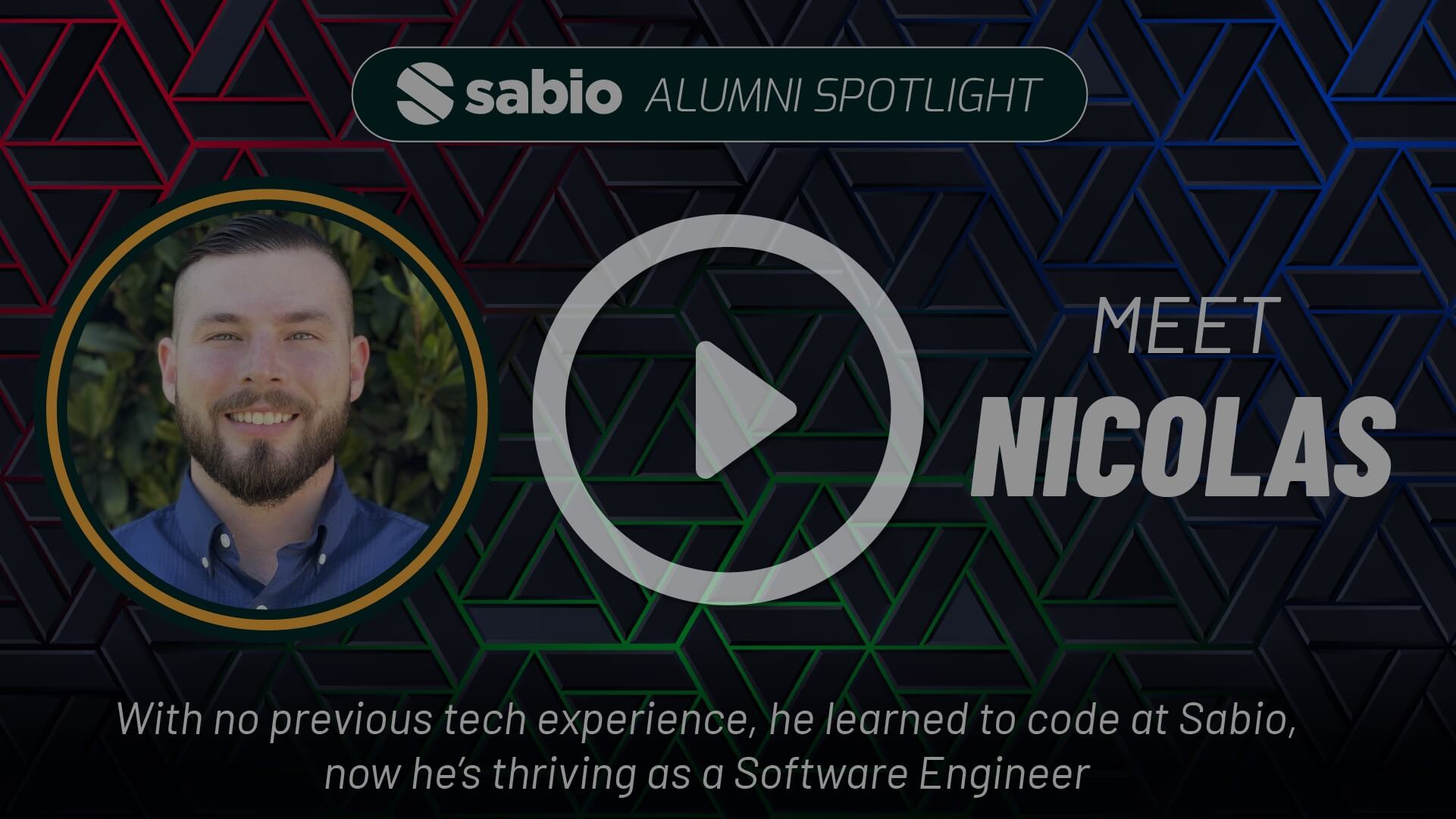Now Reading
Jon's Success Story
Thursday, April 28, 2022
Jon, a Sabio Alumni shares his success story and the adventure of transitioning into tech from the US Marine Corps
Jon, a Sabio Alumni shares his success story and the adventure of transitioning into tech from the US Marine Corps
Liliana - Thank you everyone for coming in, we'll be having a conversation with Jonathan Price. Tell us a tiny bit about you as a person before Sabio.
Jon - So I'm a Marine Corps Veteran, and I recently retired in October after 26 years of active duty service. I will say that this 26 years I did not do any programming whatsoever. Originally I was an armor officer so I drove tanks for a living and ran around the desert driving a 7 ton vehicle 40mph, shooting a 5 inch round over a mile per second and that's my idea of fun. It was awesome, but I can't say at the time I even dreamed of going into software engineering.
Liliana - Most of our vets are under ten years, what about you that really resonated with service that allowed you to spend 26 years there?
Jon -So I will say that I do come from a family that served. My grandpa served in WWII, and my Dad was a Marine back in the 1950's, so I kind of just grew up, I knew I was going to serve in the military and I chose the Marine Corps, but I did not for a second think I was going to go 26 years. In fact I attempted to get out and I did get out successfully after the first five years but back in 2003 I woke up one day and I had involuntary recall orders from the marine corps to come back and serve on active duty. They gave me ten days notice, this was when I was kicking off. So I came back after two years of involuntary recall, and I was really enjoying life and I spent about 2 and a half years in the civilian sector as a mechanical engineer and a semiconductor initially. Having seen both sides, I really loved the camaraderie of the Marine Corps so I stuck all the way to 26 years.
Liliana - So tell us a little about before your military service.
Jon -So I'm from Grant's Pass, Oregon, southern Oregon, the great pacific northwest. Currently up here in Camus, Washington. Close enough to home, but far enough away from home. So before I joined the military I did have four years of college, I'll say I was actually in the military, I went to the United States Naval Academy. Spent four years getting a mechanical engineering degree. My experience with computers at that point, Liliana I'm sure you probably know what a 386 is? Or maybe? OK! It's a brick, it had this massive hard drive of 40mb with 2mb of RAM, it was top of the line, cost about $1500 in 1991. Microsoft office did not exist yet, but the military actually created email, so I used the initial military email services prior to anything like that.
Liliana - When you separated from the service, what was the rank you had received?
Jon- I got out as a Colonel, and I was the director of force development and requirements for marine corps forces Pacific Command. So that's about 90,000 Marines that are assigned everywhere from California to Okinawa. We belong to the theater commander, the combatting commander.
Liliana - What were you doing in the TAPS program, and what were you thinking, how did you end up deciding to become a software engineer, and what research did you do to ultimately end up here?
Jon - I actually took the TAPS Course that you're referring to in January of 2021, so not that long ago. And at the time I really didn't know what I wanted to do, I won't say that the TAPS course helped me out in that matter either. When you're fairly high in management, you spend all of your day in meetings and not enough time actually doing real work, and a lot of problem solving, so I really missed that and I knew I did not want to fight at the top of the corporate ladder and I also knew that I wanted to spend some time with family. I spent a lot of time away from my family, I remember my daughter went to four different elementary schools in four years in four different states. I promised her no more, I wasn't moving, that we were going back home and staying there, and she was going to go to that same school for high school, for the last three years and I promised my son the same thing. So I knew I wanted a job where I could be remote and able to engage with the family again. Ironically I really liked the computer private program I did 34 years ago. Only 6 months of it 34 years ago, but I knew it was fun and I knew it was something I was interested in. My wife of all people told me how one of her friends of a friend had recently gone to a coding bootcamp having no prior experience in computer programming walked out with a $90,000/yr job. That sounded great, especially the idea of being remote, and her job was 100% remote. I started looking into boot camps and you'll probably know, but there's a course report. And so the research I did was I started reading through course report and looking through all the different coding bootcamps and out of reading course report I decided I'd like to go to Sabio. And then so I attended a webinar. I had a lot of terminal leave saved up after that many years, so my EAS was until 30 October 2021, but I was able to take terminal leave starting in July, so in about June my off hours I started doing the pre-work.
Liliana - which cohort did you enroll in and how many days did you have from leaving the military to starting bootcamp?
Jon - I'm a proud graduate of cohort 110 and technically I started school two weeks before my EAS. Yes, that's my last day on active duty and on 1 November I became an official retiree.
Liliana - Tell us a little about how it felt to be a remote student.
Jon - I thought it was fairly easy, and you're absolutely right. If I couldn't learn remotely then I don't know how I could work remotely. This is not the end of my learning, this is the start of my learning and I'm going to have to continue to learn for the rest of my career as a software engineer. After years of wearing a uniform it's great to get up in the morning and just put on a t-shirt, hop on the computer, no commute, driving to the office. It made it easier for me because I could get up in the morning, have my cup of coffee, sit in front of the computer and I'd usually start about an hour or so before the normal Sabio kickoff. Usually around 8 o'clock is when I hopped on the computer. Whenever I needed a snack, it was awesome. Just walk out and my wife respects me, I have the door closed, I know that's difficult with family, but mine was very good with that. I actually only didn't get on the computer on 31 December since we started. That's the only day I did not login and do at least an hour or so of programming.
Liliana - Tell us about your cohort.
Jon- We had a really tight knit group, so sometimes we'd get together after hours and not to even program, we'd just have zoom sessions, maybe a couple little programming talk in there but it was really just blowing off some steam. We did a lot of that and also very helpful around the weekends, particularly on Saturdays, or even on Sundays when you're working on a problem and the instructors are taking their well deserved couple days off, but our problems don't stop and I felt like I was perpetually behind. Being able to jump on and zoom with someone or we use slack a lot, and we just say "have you had this problem" and sometimes a little nudge, you know I'm not telling you how to do anything, but "hey did you consider this" was enough to keep us going. I love my cohort, and my instructors, we had mainly three. We had Danny, Hector, and Brijesh, all of whom were great. Completely 100% different personalities from each other, you learn differently, I loved it!
Liliana - When did you guys begin doing code talks? And tell us a little about Code Talks.
Jon I think code talks started a week or two weeks after our project started. I didn't answer your question about the project, World Print was our project. I had a great time. I can't say that before that I was having a great time. It was concepts, it was really challenging 26 years in the Marine Corps, I hadn't failed at anything, and there were sometimes I was like "Is this going to be my first fail?" Made it through all that, but the project was just awesome, not only did you use everything you learned, and I used every single concept I learned plus a lot more that you start picking up from your project. But it was really open ended, just to have an assignment on Trello, your job is to go ahead and build the cables and the procedures for the orders dashboard. So people that aren't familiar with orders dashboard from world print, it's any e-commerce site from an admin perspective of the seller is selling certain things and that individual needs to be able to track everything about an order from the shipping information to the cost information to the items in it, all the product information about those items and be able to change all that, the customer can do searches all the information you need form an e-commerce perspective. So my task was just build these products, and that was pre-prescriptive of you need to have products that do the following, and later on I found out that was only about half I needed. But I built those, and then after that I asked so what now, and they said "So build it out." That was their guidance, there was no guidance on the front, it was really my chance to just be creative. That's where also the code talks became critical, because if you have 15 different people working on the same project, trying to track what everyone else is doing and to integrate it and make sure you're not stepping on each others toes, making sure our pages look the same, that is a very tough challenge so that's where the code talks came very useful. Number one, were able to see what everyone else was doing, and they're able to demonstrate their functionality, so we made sure we were integrating each of our features appropriately, but also it was an opportunity to learn new things. My cohort mates were doing things that we never learned, so they would spend all the time on the code talk kinda describing it, and it was really amazing what they came up with.
Liliana - Did you meet and connect with your entrepreneur often?
Jon - It was mainly done with our senior instructors, our entrepreneur was a High School wrestling coach and taught during the day so he wasn't available that much, so it was mainly through our instructors, but we did have the video to go by. And we'd also had the benefit of being the second cohort to work on world print so we also got to interact with the entrepreneur when cohort 109 was giving their product demo and kinda gave an idea of what he wanted and what he was looking at. My opinion is we were well exceeding his expectations because this is a startup for him, it's an established business but it's the application doesn't exist. I know that when 109 gave their demo he was blown away and I believe that we did probably equally if not better at providing features that were very functional, very useful, but in his case he probably just would build a product that can really accelerate an entrepreneur into the future.
Liliana - Tell us a little bit about the job prep.
Jon - So the job prep, I would say this is the balancing act because previously it was very easy to focus on one thing. This is the concept you're learning, you're focusing on this. Then you get to the project and now you're focusing solely on the project and re-learning what you forgot, after being away from react for what must have been only three or four weeks, maybe more. It felt like it was four, but I was really able to focus. Once we got to the job prep, that's where it became a balancing act because we had to be working to make sure our resumes were perfect. Sabio instructors were awesome as far as preparing you, putting out the tasks for you to complete to be able to go through an interview and talk coherently about all the concepts so there was probably around 100+ questions that we had to prepare for for our interviews. And then sending out resumes we were tasked with 18 resumes per day, which doesn't sound like a lot but it's a lot. I would spend half my day just sending out resumes. The recommendation is actually five for everything, don't worry about location, in my case after 26 years and frankly having the cushion of the military retirement in my back pocket, knowing that if I could wait for the right, if I had to wait 6 months for a job I wouldn't be happy. Financially I'm in a situation where I could do that and not worry about it.
I focused almost 100% on remote and looking up any response that would show up in Portland but that took half of my time. Sending out a remote resume is one thing but dealing with the litany of emails, phone calls, once recruiters get your name, they're on you and your phone is constantly ringing so that takes up a lot of time. Meanwhile you got a project that you're working on, you got a demo coming up, you've got to practice as a cohort, make sure everything works, fix all the bugs, and be ready, I think we practice, Victor has a better idea than me, at least like 6 times for our demonstration. But the great news is that I got off easy. I only had to send out, and I wrote down the numbers, I only sent out 108 resumes which was six business days at 18 per day. I got i'll say rejected, which means I got an email back saying we have gone with someone else on about 21 of them. Four of them closed out, meaning they probably hired someone else. I withdrew on one of them because they came back with a salary and the salary was not what they advertised and I was given two offers. That's why it's only six days, I had told my wife, "Hey this is going to take 2 and a half, three months," and I was trying to temper her expectations.
It was six days before graduation where I got my first offer, and it blew me away. It was hard, really hard because it wasn't the job I wanted. It was 100% remote, in fact it was going to be working with a defense contractor who worked the tech corps, marine corps, so I probably had the background there, but it was too close to what I had been doing previously. So I really kinda wanted a change, and the job I was look for was with another defense contractor that worked with the special operations community that does some really special projects. Real world constantly, just it sounded really really cool. So it was difficult after 6 days of getting a job offer, that having several conversations with Gregorio once I got that offer, because the amount of money shocked me. I'll just say it was shocking how high it was and my conversation, I did everything I was taught to do when they ask how much money do you want, I simply said "The range that you've advertised is within my salary range." So I didn't say any numbers, just hey, you're range is out there and I knew what the range was and I was shocked by the range like, there's no way they're gonna give me that.
I did my first interview and the guy loved me, and he said "Hey I'm gonna tell my tech guys that we need to hire this guy," and the next day I did a technical interview and they asked me ten questions, I got nine and a half right, and they loved me and within fifteen minutes I had an offer. It was that quick, and I hesitated and said "Hey this is great, can I take 48 hours to decide?" With that hesitation the hiring manager immediately said "Why?" and I said, "well there's another job I'm doing an interview for." "Ok, well how about we bump up the salary $5,000?" Yeah not focusing on a single job can really, if you get more than one job you're looking at to really help that competition legitimately. I didn't want to say anything that wasn't true so I said "Well I'm still going to need 48 hours." I was able to keep on pushing it, I did my interview right before that 48 hours was up, I had my technical second interview with the company Novetta, that I was really excited about working for, they're actually being swallowed up by a cincher, but I did my interview them, my technical interview and it was one of those where Sabio prepared me perfectly, especially with the algorithm workshops. I'm not getting the same algorithm, but it was the practice of doing that and so I did my algorithm, at first I answered all their questions. After they asked me some technical stuff that they expected me to know, then they started gauging me I think more for placement, "Do you know this language, what's you're experience with this?" There was a lot of "No, but I'd love to learn," and we get to the technical part, I nailed the algorithm, then when I asked the question I was always told to ask, "Was there any reason why you wouldn't recommend hiring me?" They actually said, "No reason whatsoever, we can see where we'd put you on the team." So that was awesome, and I was worried because I had this other job offer that I didn't want to string along, I had to let the second company know, "I think I really did well, I want to work for you. I've had another offer but I choose you. I want to work for your company." And she's like "Oh, that's great news we'll see what we can do, we'll speed it up," and I talked to a different employee, a Sabio grad at the same company, I asked him, "Hey how long did it take for your offer?" He said "Two weeks," which scared me but HR when I said "hey I really need something here," she said "well I'll see what we can do," and 24 hours later I had an offer. Great offer, lower than my first offer. I emailed them back and said "I have another offer for this amount, can you meet me halfway?" The HR responded "Sure, we'll see what we can do," and 24 hours later they met me half way! So that's another benefit of having that other offer was that I was able to negotiate the lower offer up to close to the second one. I'll just once again say thank you to all the Sabio crew, really this is a game changer for an industry that only seven months ago I thought there was no way I can make this drastic of a change and you have a chance. This is a game changer and it opened up completely new career opportunities.
Liliana - Congratulations John!
Jon - Great, thank you for having me, and good luck to everyone!
During our Info Sessions you will learn all about our program, and also get to speak with Sabio team members. In addition, every week you get to hear directly from recent grads that are now thriving in tech.



Info Sessions are your chance to meet our instructors via Zoom and to get an overview
of what Sabio and Alliant International University have to offer from our innovative program.
It’s a warm environment where you can ask questions and get over any fears or hesitancy you
may be experiencing.
*All times are PDT/PST

